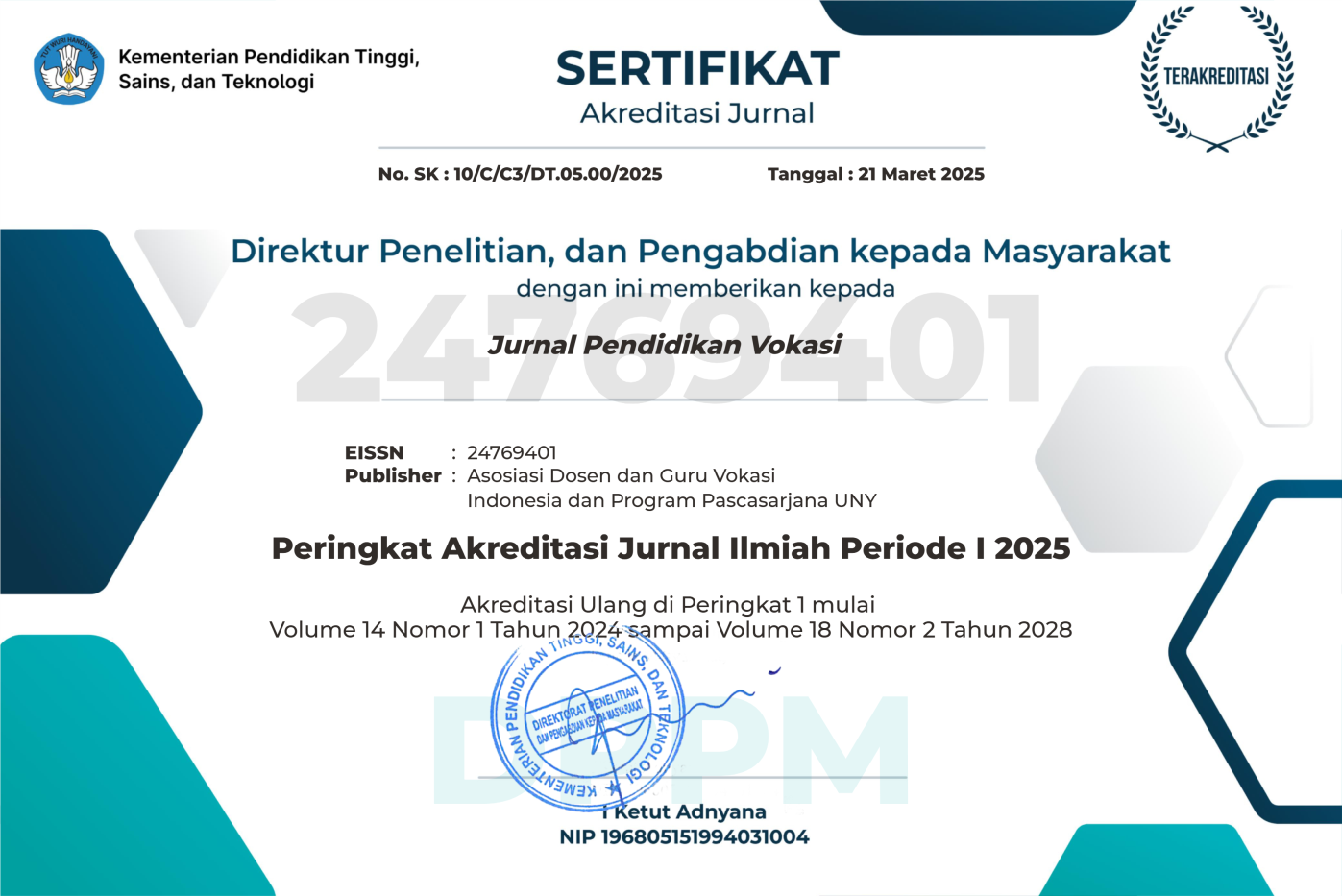Evaluasi uji kompetensi siswa keahlian multimedia di SMK se-Kota Yogyakarta
DOI:
https://doi.org/10.21831/jpv.v4i3.2564Abstract
Penelitian ini bertujuan untuk mengevaluasi uji kompetensi siswa keahlian multimedia di SMK SeKota Yogyakarta, ditinjau dari aspek: (1) context; (2) input; (3) process; (4) product; dan (5) CIPP secara akumulatif. Penelitian ini dilaksanakan pada delapan SMK di kota Yogyakarta. Populasi adalah asesor, yang berjumlah 44 orang. Sampel dengan sampel jenuh (total). Teknik pengumpulan data menggunakan angket. Uji validitas dengan validitas isi melalui expert judgement, validitas konstruk dengan uji terbatas, dan dianalisis dengan korelasi Product Moment. Uji reliabilitas menggunakan Alpha Cronbach. Teknik analisis data dengan analisis deskriptif. Hasil penelitian ini menunjukkan bahwa uji kompetensi siswa keahlian multimedia di SMK Se-Kota Yogyakarta ditinjau dari aspek: (1) context termasuk kategori sangat sesuai (84,7%); (2) input termasuk dalam kategori sangat sesuai (87,61%); (3) process termasuk kategori sangat baik (89,94%); (4) product termasuk kategori sangat baik (82,78%); (5) CIPP secara akumulatif termasuk kategori sangat baik (86,62%).
EVALUATION OF MULTIMEDIA SKILLS STUDENTS COMPETENCY TEST IN SMK YOGYAKARTA
Abstract
This study aims to evaluate the multimedia skills students competency test in SMK Yogyakarta, in terms of (1) aspects of the context; (2) the input; (3) the process; (4) the product; and (5) CIPP aspects cumulatively. This study was conducted at eight vocational schools in the city of Yogyakarta. The population was assessors, amounting to 44 people. The sample used saturated or total sample. Data collection techniques used questionnaires. Test validity of the content validity is expert judgment and construct validity with product moment correlation formula. Test reliability was carried out with Alpha Cronbach. The data analysis technique used is descriptive analysis. The results of the study show that the multimedia skills students competency test in SMK Yogyakarta in terms of (1) aspects of the context fall into the very appropriate category (84.7 %); (2) the input are in the very appropriate category (87.61%); (3) the process are the excellent category (89.94%); (4 ) the product are the excellent category (82.78 %); (5) aspects of CIPP cumulatively are the excellent category (86.62%).
References
Berry, M.F. (1979). Student competency testing. *The High School Journal*, 62(4), 166-172. Stable URL: [http://www.jstor.org/stable/40365755](http://www.jstor.org/stable/40365755).
BNSP. (2013). *Pedoman penyelenggaraan uji kompetensi keahlian (UKK) SMK tahun pelajaran 2012/2013*. Jakarta: Direktorat Pembinaan Sekolah Menengah Kejuruan.
Colardyn, D. (2009). The Certification of competencies. In R. Maclean & D. Wilson (Eds.), *International handbook of education for the changing world of work, bridging academic and vocational learning* (pp. 277-279). Bonn: Springer.
Conrad, C. F., & Wilson, R. F. (1985). Academic program review: Institutional approaches, expectations, and controversies. *ASHE – ERIC Higher Education Report No. 5*. Washington, DC: Association for the Study of Higher Education.
Depdiknas. (2003). *Undang-Undang RI No.20 Tahun 2003 tentang Sistem Pendidikan Nasional*.
Dominique M. A., Frans J. P., & Rob L. M. (2006). Learning Environments Research. *The Design Of Competency-Based Performance Assessment In E-Learning* (pp. 45-66). Leiden: Springer.
Fitzpatrick, J. L., Sanders, J. R., & Worthen, B. R. (2011). *Program evaluation: Alternative approaches and practical guidelines* (4th edition). New Jersey: Pearson.
Gangani, N., McLean, G. N., & Braden, R. A. (2006). A competency-based human resource development strategy. *Performance Improvement Quarterly, 19*(1), 127-141.
Haasler, B., & Erpenbeck, J. (2008). Assessing vocational competences. In F. Rauner & R. Maclean (Eds.), *Handbook of technical and vocational and training research* (pp. 766-774). Bremen: Springer.
Kaufman, R., & Thomas, S. (2009). *Evaluation without fear*. New York: New Viewpoint.
Kuo-Hung Tseng. (2010). Using the context, input, process and product model to assess an engineering curriculum. *Journal World Transactions on Engineering and Technology Education*. Ohio: WIETE.
Maclean, R., & Wilson, D. (2009). *International handbook of education for the changing world of work, bridging academic and vocational learning*. Bonn: Springer.
Mardapi, D. (2008). *Teknik penyusunan instrumen dan nontes*. Yogyakarta: Mitra Cendikia Offset.
National Center of Educational Statistics. (2002). *Defining and assessing learning: Exploring competencies-based initiatives*. Retrieved October 29, 2013, from [http://nces.ed.gov/pubs2002/202025.pdf](http://nces.ed.gov/pubs2002/202025.pdf).
Rauner, F., & Maclean, R. (2008). *Handbook of technical and vocational and training research*. Bremen: Springer.
Robinson, B. (2002). CIPP to approach evaluation. *COLLIT Project*.
Ruhland, S. K. (2003). Evaluating Tech Prep Education Programs: Implications for Reporting Program and Student Outcomes. *Journal of Vocational Education Research, 28*(1), 35-57.
Stern, B. (2003). *Career and workforce development trends: Implications for Michigan higher education*. Michigan: Career Institute for Education and Workforce Development Ferris State University.
Stufflebeam, D. L., Madaus, G. F., & Kellaghan, T. (2000). *Evaluation models*. Boston: Kluwer Academic Publishers.
Sudira, P. (2012). *Filosofi & teori pendidikan vokasi dan kejuruan*. Yogyakarta: UNY Press.
Sugiyono. (2011). *Metode penelitian kuantitatif, kualitatif dan R&D*. Bandung: CV. Alfabeta.
United Nations Educational, Scientific And Cultural Organization. (2003). *The use of ICTs in technical and vocational education and training, analytical survey*. Moscow: UNESCO.
Wagiran. (2011). Classroom assessment: Bagian integral proses pembelajaran kejuruan dalam upaya menyiapkan tenaga kerja secara holistik. *INVOTEC, Volume VII, No. 2*, 199-217.
Wardiman, D. (1998). *Pengembangan sumber daya manusia melalui SMK*. Jakarta: PT. Jayakarta Agung Offset.
Weiss, C. H. (1972). *Evaluation research: Methods for assessing program effectiveness*. New Jersey: Prentice-Hall.
Downloads
Published
How to Cite
Issue
Section
Citation Check
License
The authors submitting a manuscript to this journal agree that, if accepted for publication, copyright publishing of the submission shall be assigned to Jurnal Pendidikan Vokasi. However, even though the journal asks for a copyright transfer, the authors retain (or are granted back) significant scholarly rights.
The copyright transfer agreement form can be downloaded here: [JPV Copyright Transfer Agreement Form]
The copyright form should be signed originally and sent to the Editorial Office through email to jpvokasi@uny.ac.id
Jurnal Pendidikan Vokasi by http://journal.uny.ac.id/index.php/jpv is licensed under a Creative Commons Attribution-ShareAlike 4.0 International License.












